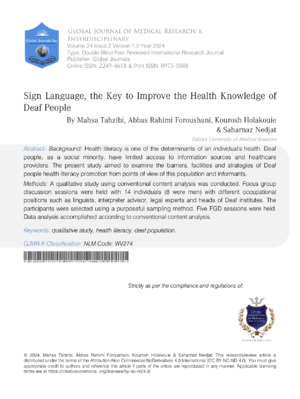Sign Language, The Key to Improve the Health Knowledge of Deaf People
Keywords:
qualitative study, health literacy, deaf population
Abstract
Background Health literacy is one of the determinants of an individual s health Deaf people as a social minority have limited access to information sources and healthcare providers The present study aimed to examine the barriers facilities and strategies of Deaf people health literacy promotion from points of view of this population and informants Methods A qualitative study using conventional content analysis was conducted Focus group discussion sessions were held with 14 individuals 8 were men with different occupational positions such as linguists interpreter advisor legal experts and heads of Deaf institutes The participants were selected using a purposeful sampling method Five FGD sessions were held Data analysis accomplished according to conventional content analysis Results The results were classified into three categories as barriers limited communication with health care providers and limited access to health information sources facilities supportive laws and the activities of the supportive institutes for deaf people and strategies Deaf-tailored health information and the usage of interpreter services of Deaf people s health literacy promotion Conclusion According to the existing supportive laws due to the right of using the sign language and the interpreters for equal access to health services it can reduce the limitations of access to health information sources and communication with healthcare providers It is highly recommended that professional interpreters should be used to facilitate communication
Downloads
How to Cite
References

Published
2024-07-10
Issue
Section
License
Copyright (c) 2024 Authors and Global Journals Private Limited

This work is licensed under a Creative Commons Attribution 4.0 International License.